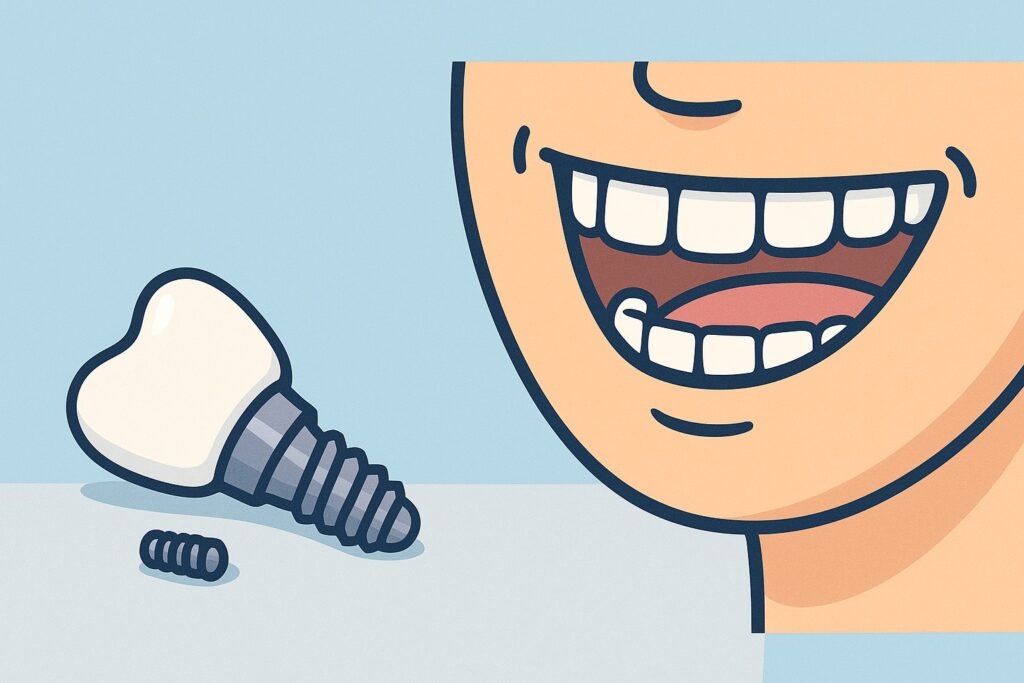A dental implant is designed to feel and function like a natural tooth. So when it starts to feel loose, it can cause immediate concern. Unlike a natural tooth that might shift slightly under pressure, a properly placed dental implant should remain stable. If there’s noticeable movement, it’s a sign that something is wrong — but not all cases require emergency treatment. Understanding the cause and knowing how to respond can help protect your oral health and prevent complications.
Common Reasons a Dental Implant Feels Loose
A loose dental implant doesn’t always mean the implant itself is failing. There are several possible reasons for the movement, and each requires a different treatment approach.
1. Healing Complications
In the early weeks after placement, the implant undergoes a process called osseointegration — where the surrounding bone fuses with the implant. If this process is disrupted by infection, excessive pressure, or poor healing, the implant may fail to anchor properly and become loose.
2. Loose Abutment or Crown
Often, the implant post remains intact, but the abutment (the connector between the implant and crown) or the crown itself becomes loose. This is a mechanical issue, not a biological failure. Dentists can usually fix this quickly by tightening or replacing the component.
3. Bone Loss or Infection (Peri-Implantitis)
Bone loss around the implant can cause instability. A common cause is peri-implantitis — a bacterial infection that affects the gum and bone surrounding the implant. If untreated, it can lead to implant failure.
4. Implant Failure
In rare cases, the implant may fail to integrate with the bone or may fracture due to excess force or poor positioning. This typically requires removal and may need bone grafting before a new implant can be placed.
When Is It a Dental Emergency?
Not every loose dental implant requires an immediate trip to the emergency dentist, but certain signs do point to urgent care needs. Understanding when the situation is critical can help prevent long-term damage.
Signs That Require Immediate Attention
- Severe pain or swelling around the implant site
- Bleeding or pus coming from the gums near the implant
- Visible movement of the implant post itself (not just the crown)
- Fever or signs of infection, especially after recent implant surgery
- Sudden change in bite or discomfort when chewing
If any of these symptoms occur, it’s important to contact your dentist or oral surgeon immediately. Delaying care could lead to further bone loss, infection, or total implant failure.
Urgent but Not Emergency Situations
- A wobbly crown or abutment without pain or infection is usually not an emergency but should be addressed soon.
- Mild discomfort or looseness noticed over time may indicate early implant problems or mechanical issues, but it can typically wait a day or two for professional evaluation.
When in doubt, it’s always safer to call your dental provider and describe the symptoms. They can help determine whether immediate treatment is necessary.
What to Do If Your Dental Implant Is Loose
If you notice your dental implant feels loose, avoid trying to self-diagnose or fix it at home. The right steps can help prevent further complications and may even save the implant.
Step-by-Step Actions to Take
- Avoid putting pressure on the implant
Stop chewing on that side of your mouth. Avoid hard or sticky foods that could worsen the looseness or cause more damage. - Do not attempt to tighten anything yourself
Whether it’s the crown or the abutment, never try to screw it back in or remove it. This can damage the implant or surrounding structures. - Call your dentist as soon as possible
Describe the sensation — is it the whole implant or just the crown? Are there any signs of pain, swelling, or bleeding? These details help your dentist prioritize the visit. - Maintain good oral hygiene
Continue brushing gently around the area and rinse with an antiseptic mouthwash if advised. Keeping the area clean helps prevent infection while you wait for your appointment. - Avoid over-the-counter dental adhesives
Temporary fixes like glue or bonding agents are not safe for implants and can complicate professional repair.
What Not to Do
- Don’t delay your dental visit. Even if the implant doesn’t hurt, it can become worse quickly.
- Don’t try home remedies to “tighten” or “clean” the implant site aggressively — this can cause more harm than good.
How Dentists Diagnose and Treat a Loose Implant
When you visit your dentist for a loose implant, their goal is to determine what part is loose and why, then recommend the least invasive but most effective solution.
Diagnosis Process
- Clinical Examination
The dentist will examine the implant area, checking for signs of inflammation, movement, and pain. They’ll identify whether the looseness is in the crown, abutment, or implant post. - X-rays or 3D Imaging
Dental imaging helps assess the bone around the implant. It shows whether there is bone loss, infection, or improper integration of the implant with the jaw. - Testing the Components
Each part — the crown, abutment, and implant post — is tested separately to locate the source of the problem. Often, the issue is mechanical rather than biological.
Possible Treatments
- Tightening or Replacing the Abutment or Crown
If the crown or abutment is loose, it can typically be tightened or replaced without affecting the implant itself. - Deep Cleaning for Early Infection (Peri-Implant Mucositis)
If inflammation is caught early, your dentist may perform a deep cleaning to remove bacteria and stabilize the area. - Treatment for Peri-Implantitis
In more advanced cases involving infection and bone loss, surgery may be needed to clean the site, regenerate lost bone, or remove infected tissue. - Removing and Replacing a Failed Implant
If the implant post is failing, it must be removed. After healing and possible bone grafting, a new implant can be placed in the same or a different location.
Each case is unique, and dentists aim to preserve the implant whenever possible. Early intervention often means simpler treatment.
How to Prevent Implant Loosening in the Future
While dental implants have a high success rate, long-term stability depends on proper care and habits. Here’s how you can reduce the risk of future implant complications.
1. Prioritize Daily Oral Hygiene
Plaque and bacteria buildup around implants can lead to gum inflammation and bone loss. Brush twice daily with a soft-bristled toothbrush and use interdental brushes or floss designed for implants. Antibacterial mouth rinses can also help reduce infection risk.
2. Keep Up With Regular Dental Visits
Routine dental checkups (usually every 6 months) allow your dentist to monitor the implant, surrounding bone, and soft tissue. Early detection of any issues is key to preventing implant loosening or failure.
3. Address Teeth Grinding or Clenching (Bruxism)
Excessive pressure from grinding can damage implants over time. If you grind your teeth, your dentist may recommend a night guard to protect both natural teeth and implants.
4. Avoid Smoking and Tobacco Use
Smoking significantly increases the risk of implant failure. It restricts blood flow, delays healing, and contributes to bone loss around the implant.
5. Don’t Use Your Teeth as Tools
Opening packages, biting fingernails, or using your teeth to crack hard objects can stress the implant components and cause loosening. Always use the right tools — not your teeth.
Conclusion
A loose dental implant can be alarming, but it’s not always an emergency. The key is to determine whether the issue is with the implant post, the crown, or the surrounding tissues. While a minor mechanical issue can be easily fixed, more serious cases like infection or implant failure need prompt attention. The sooner you see your dentist, the better your chances of preserving the implant. With proper care, follow-ups, and good oral habits, most implants can last for many years without issues.

